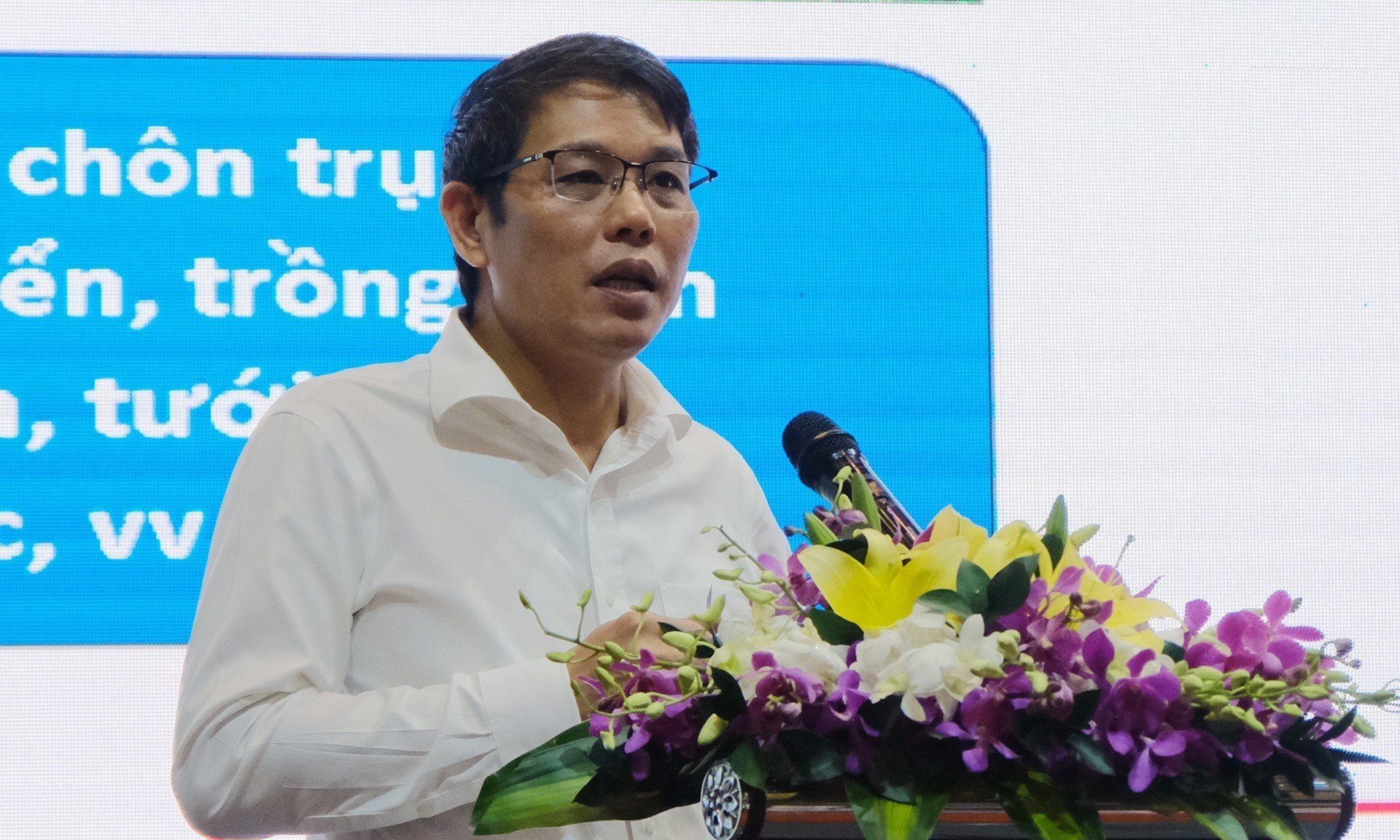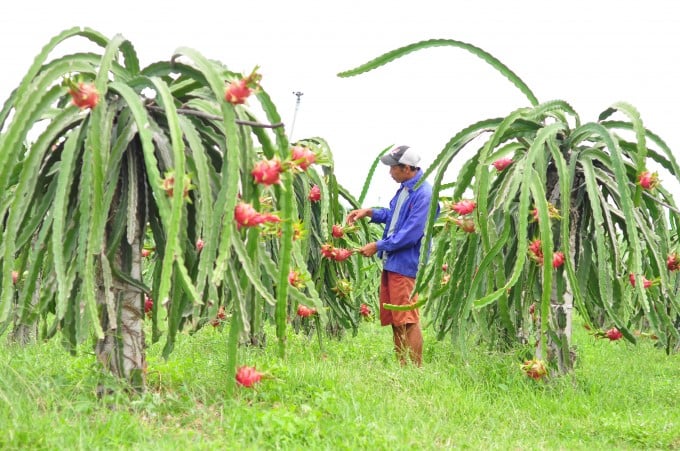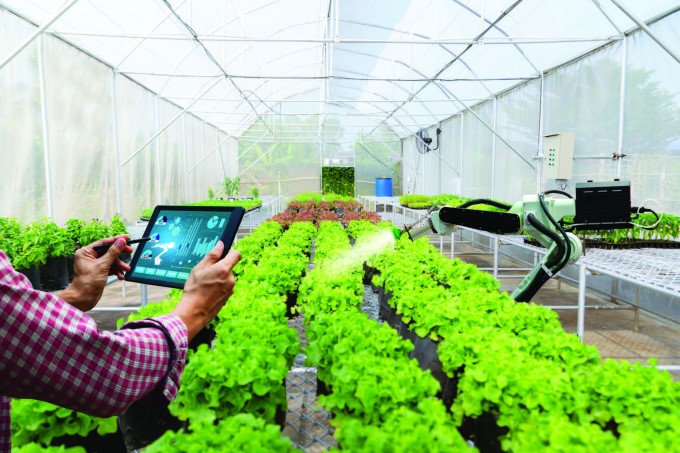June 21, 2025 | 03:23 GMT +7
June 21, 2025 | 03:23 GMT +7
Hotline: 0913.378.918
June 21, 2025 | 03:23 GMT +7
Hotline: 0913.378.918
At the seminar "Digital Transformation Towards Green Agriculture and Sustainable Development" co-held by the Ministry of Agriculture and Rural Development (MARD) and the United Nations Development Programme (UNDP) on August 17 in Hanoi, for the first time, UNDP and MARD introduced the model of an electronic traceability system to track the origin and "carbon footprint" of each dragon fruit produced in Binh Thuan.

Mr. Vu Tan Phuong, consultant to the Agricultural NDC Project. Photo: Bao Thang.
According to Mr. Vu Tan Phuong, consultant to the Agricultural NDC Project, with this system, domestic and international consumers, when buying or importing dragon fruit from the key production area of Binh Thuan, can scan the QR code to trace the fruit’s origin and the level of "green" or environment-friendly practices applied to produce this fruit in the most transparent manner.
Smart devices that automatically measure carbon emissions are installed at each orchard, and updated data is sent to cyberspace, allowing real-time "carbon footprint" tracking and statistics. Not only that, but this technology also analyzes and offers solutions for reducing carbon emissions in the production and transportation of agricultural products.
As of now, 99 orchards of farmers belonging to four cooperatives in Binh Thuan (including Hoa Le Dragon Fruit Cooperative, Ham Minh Cooperative, Thuan Tien Cooperative, and Phuc Ha Company) have been granted accounts to join this system.
In recent times, dragon fruit-growing areas in Binh Thuan have applied farming solutions to reduce carbon emissions. Typical examples include improving the efficiency of lighting electricity by switching from compact bulbs to LED lamps. Currently, in Binh Thuan, the percentage of dragon fruit-growing households using LED lamps instead of compact bulbs in the growing areas according to GlobalGAP standards reaches 73%; VietGAP of 45%; organic standards of 50%; and traditional method of 35%.

Binh Thuan dragon fruit area has applied many farming solutions in the direction of emission reduction and "green" production. Photo: KS.
Mr. Nguyen Duc Tri, Deputy Director of Binh Thuan Agricultural Extension Center, said that the digital transformation path can start from different stages depending on the needs and conditions of each unit, but it must be towards the overall goal of all stages (from input, production, processing, purchasing, distribution, market, etc.). Here, state management agencies in the agricultural sector play an extremely important role in orienting, facilitating promotion, connection, and initial investment for digital transformation.
Regarding digitization and application in the fruit industry to improve the export capacity of Vietnamese producers, Ms. Hoang Mai Van Anh, representative of the United Nations Industrial Development Organization (UNIDO), said that this agency has accompanied the Department of Agricultural Product Quality, Processing, and Market Development under MARD to provide a lot of technical support to improve the capacity to comply with quality standards for the fruit industry.

Digital technology increasingly plays an important role in supporting production monitoring, product traceability, and production management in the direction of emission reduction. Photo: TL.
In addition to technology solutions and practices in all stages, from production to preliminary processing, processing, and export, UNIDO also supports digitization solutions to increase transparency in the supply chain, creating trust for businesses in the market and the confidence of producers and consumers in products.
For example, a digital platform to identify the main causes of non-compliance in main export markets (SCA tools, digitization of standard operating procedures (SOPs) for fruit production and export); activate inclusiveness, smart climate, and global supply chain traceability (Koltitrace system); log traceability of growing areas and manage growing area codes and packing facility codes.
Mr. Nguyen Quoc Toan, Director of the Center for Digital Transformation and Agricultural Statistics under MARD, said that smart consumers care about health, transparency, social values, and interactive space. Therefore, the countryside will be the motivating factor for the next boom in the digital economy. Digital applications in agriculture and rural development will be opened up in many directions, in which digital technologies such as sensors, automatic monitoring systems, and artificial intelligence (AI) will be applied to monitor and adjust agricultural production processes and improve the productivity and quality of agricultural products.
Binh Thuan has a total dragon fruit area of about 28,000 hectares, with half of the area grown according to organic standards, VietGAP, and GlobalGAP. Output reaches about 600,000 tons/year, of which about 80–90% are for export. Digital transformation solutions will promote faster and more efficient "green production" transformation, contributing to meeting the requirements of the market, especially the export markets, and helping Vietnam achieve the Government's commitment to emission reduction targets.
Translated by Huyen Vu Thu
![Turning wind and rain into action: [9] Digitizing hydrometeorological data in response to climate change](https://t.ex-cdn.com/nongnghiepmoitruong.vn/608w/files/news/2025/06/17/z6704423696987_15fd32ffc26d590d204d520c9dac6786-nongnghiep-165943.jpg)
(VAN) Farmers have begun accessing hydrometeorological applications to adjust their cropping schedules, aiming to ensure productivity and adapt to climate change.
![Turning wind and rain into action: [8] Real-time salinity detection and early warning technology](https://t.ex-cdn.com/nongnghiepmoitruong.vn/608w/files/news/2025/06/17/z6704423696987_15fd32ffc26d590d204d520c9dac6786-nongnghiep-151127.jpg)
(VAN) Thanks to the integration of modern hydrological-hydraulic models, remote sensing technologies, and artificial intelligence, the accuracy of hydrological forecasting has significantly improved.
![Turning wind and rain into action: [7] Early disaster warnings help marine farmers minimize losses](https://t.ex-cdn.com/nongnghiepmoitruong.vn/608w/files/news/2025/06/17/z6704423696987_15fd32ffc26d590d204d520c9dac6786-nongnghiep-142942.jpg)
(VAN) In recent years, thanks to early disaster warnings and forecasting, marine farmers in Khanh Hoa province have been able to reduce risks and losses, thereby improving production efficiency.
![Turning wind and rain into action: [6] ‘Four on-the-spot’ disaster management software](https://t.ex-cdn.com/nongnghiepmoitruong.vn/608w/files/news/2025/06/17/e5a48259d6a262fc3bb3-nongnghiep-183800.jpg)
(VAN) By simply activating the scenario on the disaster management software, the relevant authorities immediately know how many households need to be evacuated, where to evacuate them to, and by what means of transportation…
![Turning wind and rain into action: [5] Hue applies modern technology in disaster forecasting](https://t.ex-cdn.com/nongnghiepmoitruong.vn/608w/files/news/2025/06/17/z6704423696987_15fd32ffc26d590d204d520c9dac6786-nongnghiep-093938.jpg)
(VAN) In Hue city, modern technology has recently been applied in meteorological and hydrological forecasting and warning, helping to reduce the damage caused by natural disasters.

(VAN) A cutting-edge farming technique being implemented on an experimental ranch in Arizona's Sonoran Desert has already saved a billion gallons of water over five years, according to Civil Eats.

(VAN) Poultry and pig production and the environment can be boosted through enhanced water technology, according to new research.